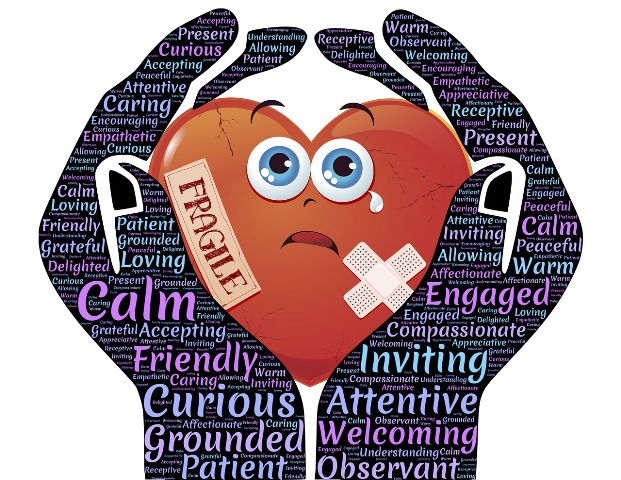“To fear love is to fear life, and those who fear life are already three parts dead.” – Bertrand Russell
Hearing someone say that they’re scared of heights, or of confined spaces is commonplace enough. When you hear someone say that they’re phobic about dinner parties or French people, you raise an eyebrow. Then again, what’s the big deal – all you need to do is decline invitations and stay away from the French! But when you hear about someone having a fear of love, you raise both your eyebrows, widen your mouth, and stop whatever you’re doing. How can someone be afraid of love? Is that even a thing? What is Philophobia after all, and how does one live with it?

Image source: Pixabay, under Creative Commons License
Suggested read: 10 surefire signs you have an irrational fear of commitment
What is Philophobia?
In Greek, ‘philo’ means love, and well, we all know what phobia means. Putting these together, you get philophobia, a constant, unnatural fear of falling in love with someone. This phobia manifests itself whenever there is a possibility of developing an emotional connection with another person, particularly of the opposite sex.
As humans, positive emotional relationships are essential for us to thrive, and these include both familial as well as romantic ones. A person suffering from philophobia is not devoid of this need, it’s just that they are too scared to actually take the plunge into the relationship. Being unable to fulfill their natural desire for human connection, they often end up retreating into themselves, spending a lot of time alone. Despite their fear, they often end up thinking a lot about love and the fact that they can’t seem to give or receive affection tortures them even more.

Image source: Pixabay, under Creative Commons License
When another person expresses any kind of romantic interest in someone with philophobia, they tend to retreat and run in the opposite direction, even if the potential suitor seems perfectly fine. Any indication that a friend or colleague is getting too close, and the philophobic person puts up a wall. They aren’t happy about any of this, it’s just that they can’t get over their deep-rooted resistance to love. It’s important to note that philophobia is not the same as a fear of sex, known as Genophobia or Coitophobia. The two are entirely different, as a person who is in a loving relationship is not philophobic but may be terrified of physical intimacy.
Generally, philophobia’s reach is limited to romantic partners, but in severe cases, it can extend to friends and family. In such cases, sufferers of philophobia can completely withdraw into a shell, and both their physical and mental health can be at stake.
What causes philophobia?
Now that we’ve answered the question what is philophobia, the next question is bound to be what causes it? Experts seem to think that this fear of being in love is actually a fear of being vulnerable. When you’re in a romantic relationship, it is required that you open up to the other person, and let them see you for who you really are. Your happiness begins to depend on the responses of your partner, which is something beyond your control. And as you can imagine, this introduces the element of risk in the relationship, one that is too scary for a philophobic to deal with. So in some ways, you can equate a fear of being in love as a fear of losing control, of ending up hurt after showing your vulnerable side.

Image source: Pixabay, under Creative Commons License
A common cause for philophobia is past trauma, especially from broken relationships. This can be due to two reasons – trauma from the person’s own experience, or from witnessing someone else’s disastrous relationship, possibly a family member’s. A person who has given everything to a relationship only to have their heart broken may have very deep scars, making it difficult for them to move on. Growing up in a home where parents are continually hostile to each other can also cause a person to mistrust relationships in general.
Another cause for philophobia is an existing mental condition, like depression. People with very low self-esteem may think of themselves as unworthy or undeserving of another person’s love, and this can keep them away from fully forming a relationship, even with people they actually like.
Then there are cases where people have been brought up to obey certain cultural or religious norms which put romantic relationships in a negative light. Those who’ve grown up in very strict households where such rules are rigidly followed can have a lot of trouble to get over their mind blocks regarding love and relationships.
Like many other phobias, philophobia may run in families, especially if there are associated mental conditions like anxiety or depression.
Suggested read: 12 tips on how to cope with abandonment issues in relationships
Symptoms of philophobia
After reading everything above, it probably looks like philophobia is just a mild mental disturbance, but the fact is that philophobia has real physical symptoms. They usually appear when a person is in an intimate situation or if there is a possibility of a romantic interest approaching. Most of the time, the symptoms of philophobia resemble those of a panic attack, such as:
- Racing heart beat
- Sweating
- Breathing difficulty
- Nausea
- Fainting, in extreme situations

Image source: Pixabay, under Creative Commons License
Then of course, there are those other telltale signs that a person is afraid of love and relationships – staying away from occasions like weddings, walking away on spotting lovey-dovey couples, and basically avoiding any conversation on potential dates or romance. If you know someone who consistently exhibits such behavior, it is highly likely that they suffer from philophobia.
Treatment for philophobia
For many people, reading about the description and symptoms of philophobia is like a light bulb moment – it seems to perfectly describe someone they know or knew earlier! Understanding a relatively rare condition like philophobia is the first step in managing it. While it isn’t possible to cure a complicated issue like philophobia overnight, it can be managed with different kinds of therapy, which are known to show positive results over a period of time.
Systemic Desensitization Therapy
This therapy works on the basic principle that repeated but low-level exposure to the object of the phobia helps to eventually desensitize the person. For philophobia, therapists can use virtual reality to create date-like scenarios for the person to get over their fear without actually having to date a real person.
Cognitive Behavioral Therapy (CBT)
Cognitive Behavioral Therapy encourages a philophobic person to go into their own thoughts and ‘feel their feelings’. By being more aware of the exact thoughts that occur in a fear situation, they can have more control over them. Gradually, they can learn techniques to replace negative thoughts with positive, affirmative ones, thus training their mind to overcome their fear. This has been found to be one of the most successful therapies for philophobia so far.
Hypnotherapy
This is a rather unconventional approach to treat philophobia, since it requires the sufferer to relinquish control to the therapist – not something philophobics are good at! However, if they are able to do it, hypnotherapy can identify the cause of their panic attacks and help them remove deep-seated fears regarding relationships.
For many patients, a combination of therapies usually gives best results. It is difficult to predict how long it’ll take to be free from philophobia, and the cause of the fear is a factor. In some cases, drugs like antidepressants may be prescribed, especially if a person’s philophobia comes under the spectrum of anxiety disorders.
Dealing with philophobia
As mentioned earlier, philophobia is not your average fear of snakes or heights, and can be very hard for another person to understand. Even the person suffering from philophobia may not be able to fully comprehend why they are feeling this way, and why they can’t seem to make any relationship work while everyone around them are happily falling in love, getting married, and having families. This inability to grasp their situation can make them feel even worse about themselves, and lower their self-esteem further.

Image source: Pixabay, under Creative Commons License
As for a person in love with a philophobic – you have your work cut out for you! Loving a person who fears love can be incredibly challenging, but this is a true test of whether your love is unconditional. As with any other condition, gathering as much information as you can about the phobia is imperative to be able to understand what your loved one is going through – they’re probably feeling more guilty and helpless than you are. First, ask yourself if you are ready for the challenge at hand and if you’re willing to wait for an undefined period of time to actually have a proper relationship with this person. If you are, then go ahead and give them all the support you can, and encourage them to take small but consistent steps in seeking proper treatment.
Suggested read: What is unconditional love? Is it the key to long-lasting relationships?
Life is unpredictable, love makes it worthwhile – all kinds of love. Falling in love is meant to be a beautiful experience, one that makes the harsh world seem a much better place for us. Not being able to experience this fully can leave a person feeling incomplete and unfulfilled. With a loving partner, family and friends, it is possible to overcome philophobia, slowly but surely, and truly begin to enjoy the wonders of a loving relationship. And when you support your philophobic partner to overcome their fear, you are only laying the foundation for a beautiful relationship in the future. As Lao Tzu said, “Being deeply loved by someone gives you strength, while loving someone deeply gives you courage.”
Featured image source: Pixabay, under Creative Commons License













